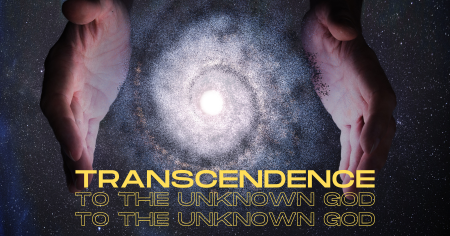Bulletin
“Transcendence”

While Paul waited for Silas and Timothy in Athens, “his spirit was provoked within him when he saw that the city was given over to idols” (Acts 17:16). To illustrate the state of that city, the Holy Spirit used the word, kateidōlos. The word is used only in this place. It means “utterly idolatrous” (Strong). Athens was “wholly given to idolatry” (KJV). One could not stroll through the city without noticing alters, temples, and images dedicated to, and representing various false gods. “Petronius (Sat. xvii.) says humorously of the city, that ‘it was easier to find a god than a man there’” (Albert Barnes’ Notes on the Bible). Thus Paul stated, “Men of Athens, I perceive that in all things you are very religious” (v. 22).
And why were they so religious? It is the created state of every man to long for such. It is no mere coincidence that the human race owns such a copious amount of religions. Even those who do not subscribe to belief in a higher being have their own objects of worship. They seek fulfillment of the created need in secular things – jobs, riches, etc. Yet, the Athenians dedicated their lives to several gods. These gods, Paul believed, and the Holy Spirit taught, were figments of the imagination – “we know that an idol is nothing in the world, and that there is no other God but one” (1 Corinthians 8:4).
Interestingly enough, Athens had a history of recognizing the inferiority of the idols. For the apostle “even found an altar with this inscription: TO THE UNKNOWN GOD” (v. 23). Lest they leave any god out they made alters to gods of which they might be ignorant. However, erecting alters for unknown gods was also linked to a lack of confidence in the other gods during times of hardship. Consider the comments of Albert Barnes on Acts 17:23:
 “There was a remarkable altar raised in Athens in a time of pestilence, in honor of the unknown god which had granted them deliverance. Diogenes Laertius says that Epimenides restrained the pestilence in the following manner: ‘Taking white and black sheep, he led them to the Areopagus, and there permitted them to go where they would, commanding those who followed them to sacrifice τῶ προσήχοντι θεῷ tō prosēkonti theōto the god to whom these things pertained or who had the power of averting the plague, whoever he might be, without adding the name and thus to allay the pestilence. From which it has arisen that at this day, through the villages of the Athenians, altars are found without any name’ (Diog. Laert., book i, section 10). This took place about 600 years before Christ, and it is not improbable that one or more of those altars remained until the time of Paul. It should be added that the natural inscription on those altars would be, ‘To the unknown God.’ None of the gods to whom they usually sacrificed could deliver them from the pestilence. They therefore reared them to some unknown Being who had the power to free them from the plague.” [Emphasis is my own, JC.] (Albert Barnes’ Notes on the Bible)
“There was a remarkable altar raised in Athens in a time of pestilence, in honor of the unknown god which had granted them deliverance. Diogenes Laertius says that Epimenides restrained the pestilence in the following manner: ‘Taking white and black sheep, he led them to the Areopagus, and there permitted them to go where they would, commanding those who followed them to sacrifice τῶ προσήχοντι θεῷ tō prosēkonti theōto the god to whom these things pertained or who had the power of averting the plague, whoever he might be, without adding the name and thus to allay the pestilence. From which it has arisen that at this day, through the villages of the Athenians, altars are found without any name’ (Diog. Laert., book i, section 10). This took place about 600 years before Christ, and it is not improbable that one or more of those altars remained until the time of Paul. It should be added that the natural inscription on those altars would be, ‘To the unknown God.’ None of the gods to whom they usually sacrificed could deliver them from the pestilence. They therefore reared them to some unknown Being who had the power to free them from the plague.” [Emphasis is my own, JC.] (Albert Barnes’ Notes on the Bible)
The evidence in creation points to a transcendent being. Observation of that which is made links certain characteristics to its Creator – “His eternal power and Godhead” (Romans 1:20). However, instead of submitting to such indications, and searching God out, they made Him to be “like corruptible man – and birds and four-footed animals and creeping things” (Romans 1:23). They “worshiped and served the creature rather than the Creator”(Romans 1:25) until such a time as the striking of pestilence. Then they worshiped the UNKNOWN GOD, yet ignorantly, thus to no avail.
The established truths of the cosmos exhibit evidence of creative power possessed by One without limits. Transcendent is He Who made all things. He does not need us, but we need Him. He has made Himself available to us “that [we] should seek the Lord, in the hope that [we] might grope for Him and find Him” (v. 27). In doing so He expects for us to understand the fundamental aspect of His nature. He is not like any other. His ways transcend all others’ (cf. Isaiah 55:9). We must approach Him accordingly (cf. 1 Peter 1:15).
“Truly, these times of ignorance God overlooked, but now commands all men everywhere to repent, because He has appointed a day on which He will judge the world in righteousness by the Man whom He has ordained. He has given assurance of this to all by raising Him from the dead” (Acts 17:30-31).





